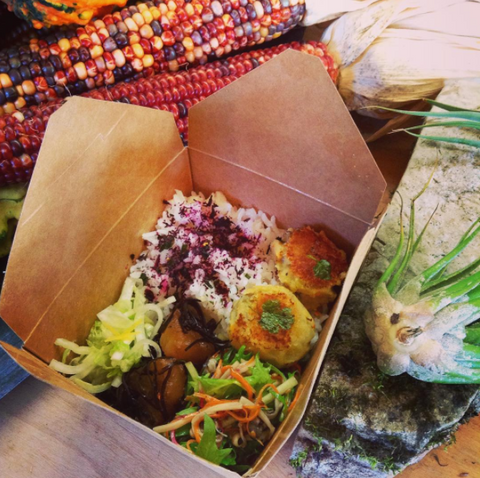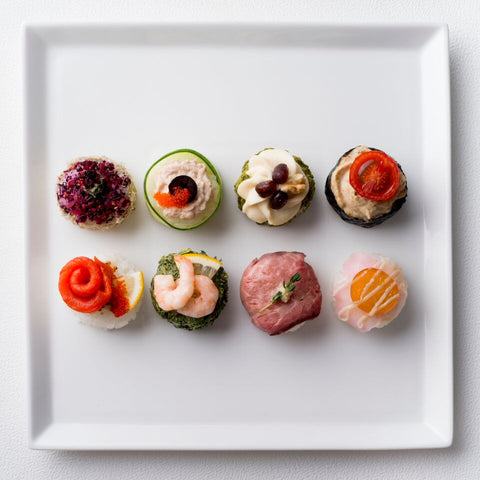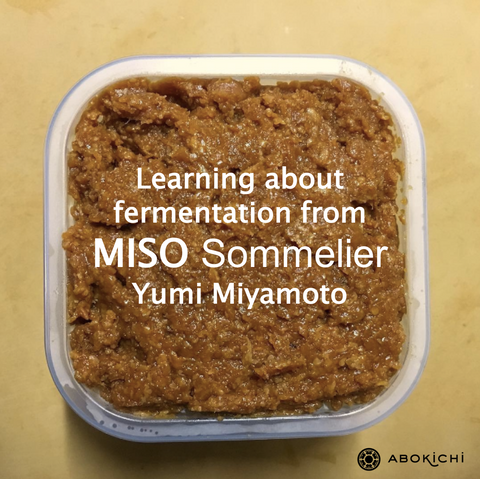There are many options for eating, paleo, gluten-free, vegan and so on….. Have you ever heard of Macrobiotic?
It is not only a way of eating, but also a philosophy of life based on Japanese tradition.
Today we will feature a professional macrobiotic chef, Yayoi, who is visiting Toronto, and will share the world of Macrobiotic food and lifestyle.
Abokichi: How did you find out about/get into Macrobiotic?
Eight years ago, I visited a café in the countryside of my hometown, Hamamatsu. The owner of the café told me interesting stories about the rules of the universe. For instance, the moisture level of the earth gets maximum at full moon and minimum at new moon. So do the woods too. That was the reason new houses were built of wood cut at new moon traditionally in Japan. She also asked me which space was better for writing, either in an open hill top or closed building. I thought it would be comfortable in an open hill top, but I would be distracted by beautiful surroundings. Then she explained about Yin and Yang (Cooling and Warming). Yin and Yang can be described as expansion and contraction. In an open space, people’s mind tends to expand. On the other hand, in a closed place,it tends to contract. So we can decide which is a better place based on your situation. She also said that a life can be different by a single choice. Therefore,she doesn’t compromise at all when she does shopping. She always examines how things are made/grown, for whom, of what materials, to see the true value of the items.
For me, a wooden rice bin meant a lot. It was used to keep and serve cooked rice in Japanese households before the electric rice cooker was introduced. She said that rice can breathe and stay delicious and even become tastier in a wooden rice bin, while a metal pot can lead to decay.
I could not resist buying a handmade wooden bin which cost me $500. (It needs high skills to bend and put together pieces of wood and less and less people can make them.) For a twenty something person, $500 was huge. It was my turning point. I think my sense of values changed after I met this lady who taught me about Macrobiotic. Soon after, I started to learn her cooking techniques by living with and helping her at the café for a month. I felt my body and mind was shifting to an original and ideal direction by Macrobiotic living.

Abokichi: How do you define Macrobiotic?
In a brief way of saying, it is to know yourself and the world better. There is no absolute right and wrong, and Macrobiotic can help you to find the fundamental well being within you in harmony with Mother Earth.
Abokichi:Tell me the basic practice of Macrobiotic.
I will explain the main essential beliefs.
Ichibutsuzetai
Human don’t exist as parts. A chicken is not only drum and breast. An apple seed contains toxic substance that can be fatal, but there is another substance to offset the toxin, therefore, we don’t die even if we eat apple seeds. Brown rice consists of carbs, fibre, bran and germs. When eaten as whole, the bran will help circulation of the energy and it will be metabolized well, but when consumed as a white rice, it will be metabolized slowly and stored as a fat. When it is a whole food, it is balanced and nutritious.
Shindofuji
In literal translation, it means body and soil can’t be separated.
By eating local food, our body can easily adjust to our surroundings/environment. For instance, bananas which grows in tropical weather has cooling effect, so too much of it can be detrimental for people who tend to feel cold.
People can fully benefit from the local foods available around them in each season. Mother Nature gives their best food and we should be good as we appreciate it. Eating locally is more sustainable too. Also, we shouldn’t forget about the downsides of importing foods such as the air pollution by logistics and the post-harvest pesticide contamination.

Abokichi: Tell me about your a typical meal in summer and winter.
I like to have more noodle and stir fried dishes with sour flavour like Hiyashi Chuka more in summer. I prefer to have slowly cooked, stew type food in winter, like Oden and Miso-nikomi Udon.
Hiyashi Chuka consists of chilled ramen noodles with various toppings served in the summer. Toppings are usually colorful cold ingredients and a Japanese sauce.
Oden consists of several ingredients such as boiled eggs, daikon, konjac, and processed fishcakes stewed in a light, soy-flavoured dashi broth. Ingredients vary according to region and between each household.
Miso Nikomi Udon is a rustic dish of thick wheat udon noodles simmered in a savory miso broth with various ingredients such as fried tofu (aburaage), fish cake (kamaboko), chicken, and green onions.
Abokichi: What is your power food?
I crave miso soup with Daikon radish and Aburaage (deep fried tofu)when I feel tired.
You may think deep fried tofu is oily, but Aburaage is usually pre washed in a boiled water to remove oxidized oil before cooking
Abokichi: Do you think Canadians can benefit from brown rice and miso soup?
I think so. Brown rice, Miso and broth from Kombu has detoxification effect and miso helps maintain the proper balance of intestinal flora. Miso is alkaline and warming too. If rice and Kombu can grow locally in Canada, that would be perfect from the view of Shindofuji. But Toronto is multicultural; why not have a little bit of that essence on your dining table? I assume many people try brown rice and miso soup because they think they are healthy. I hope more people will appreciate the real flavour of them. But if it does not feel tasty, you’ d better stop eating. Enjoying the deliciousness is also important, and it leads to mindfulness naturally.
Abokichi: Why do you think Macrobiotic is getting popular?
I think this is an indication that people are overwhelmed. Maybe by too much information and choices by globalization. I believe that they try macrobiotic in search of simpler and healthier ways of living. I worked at a Macrobiotic café for three years and helped at a Macrobiotic cooking school as an assistant, and then I started teaching by myself. Student age varied from teenage to 60’s. Most of them were women who were serious about cooking authentic food for their families, but there were also some male students. Some 50-60’s came for their health problems. Some people in their 20-30’s turned to organic farming after they started to cook. In Japan, in 2011, especially after the earthquake and the nuclear incident, organic farming and food safety have caught more people’s attention. At the same time, the traditional value system of working long hours for a company and living an urban life has decreased in popularity. Some groups of people are starting new lives based on their calling, and I believe macrobiotic is a part of it, although the conventional lifestyle that efficiency is most prioritized still exists as a main stream.
Abokichi: Many parents have difficulty feeding their children. Please tell us what they can do?
Let me share my story.My mother was growing organic vegetables and cooking healthy meals from scratch. My sister had no problem finishing everything. But it took me 1-2 hours to finish each meal. Everyone has their own preference. If your child hates vegetables, you should think about potential reasons. In Macrobiotic, sugar is considered cooling, so if a pregnant mother eats a lot of sugary food, the constitution of the fetus can shift toward cold as s/he grows up in a cold womb and becomes naturally drawn to warming food such as meat. Again, we are all different. Eating little vegetables is not absolutely wrong. Some need a lot of greens and some do not. The important thing is how you eat veggies. If you know your child’s body well, you should be able to know the right kind and how you feed them.

Abokichi: How do you like Toronto?
I like openness here. Unlike in Japan, diversity is a part of daily life here and you don’t have to try to group yourself into one cookie-cutter category. I traveled to Thailand and India before Canada. I feel most welcomed and comfortable here, although I came here recently. So far, I have travelled to 20 countries, and through my journey, I always feel that food culture can connect people wherever you are. Here, I appreciate having an access to a wide range of ethnic foods. But at the same time, I am under the impression that many of them are superficial and not well established. In general, I try not to eat when the source/origin of the food is uncertain. Often times, food is seasoned too much and mixed with many things in most of the countries I have been. I hope people will appreciate authentic food with plain and original taste.
One more thing that is in my mind is that vegan is kind of a trend now. Many people shift to vegan for ethical reason. I think it’s wonderful that more people are aware of the influence of our food choices on the environment and animals. I personally don’t know if vegan is good or not. Please bear in mind that vegan can be risky; if you don’t know how to nourish yourself well.
It would be my pleasure if Macrobiotic could be an opportunity for more people to rethink their diet and lifestyles.
Writer : Ichiko Okazaki
Editor : Pearl Mantell




